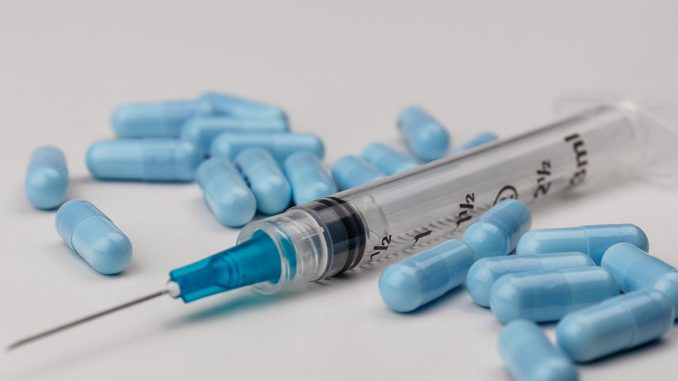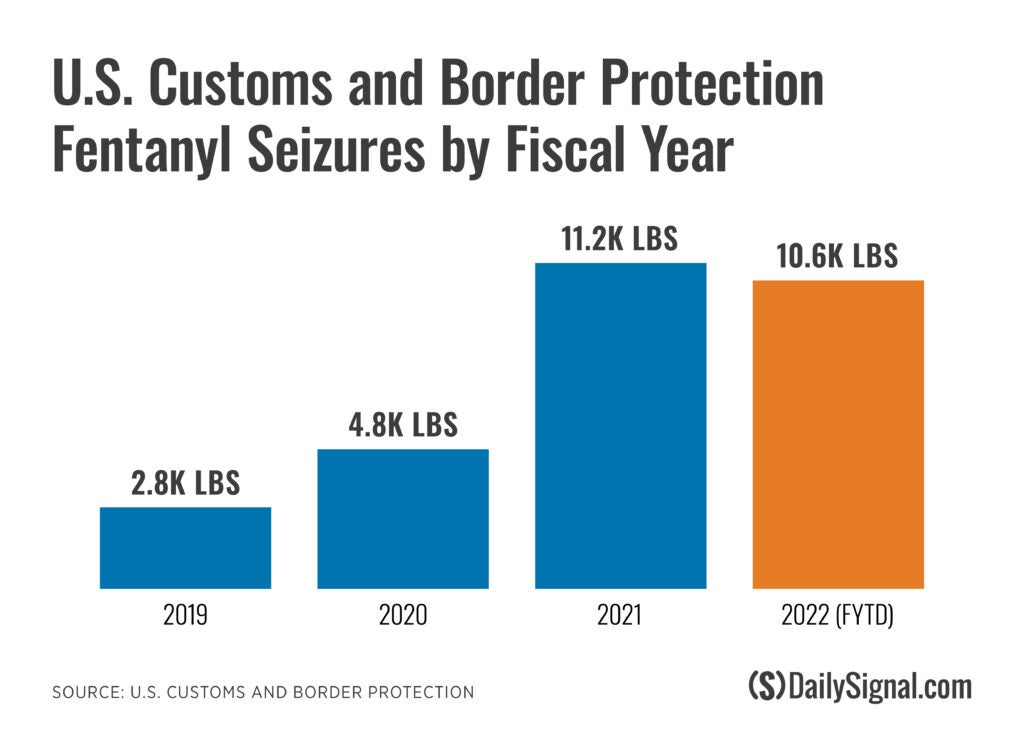
Drug overdose is the leading cause of death for Americans ages 18 to 45.
A total of 91,799 deaths from drug overdoses occurred in 2020, the Centers for Disease Control and Prevention reports. Opioid drugs, such as fentanyl, were involved in 68,630, or 75%, of these overdose deaths.
“It’s undisputed that the leading cause of deaths among adults 18-45 is fentanyl, and there were more than 107,000 drug-related overdoses last year in the U.S.,” Mark Morgan, head of U.S. Customs and Border Protection during the Trump administration, told The Daily Signal.
“What you don’t hear from the Biden administration is that 95% of the fentanyl killing Americans comes from the wide-open southwest border,” said Morgan, now a visiting fellow in The Heritage Foundation’s Border Security and Immigration Center. “How many more people have to die before we say enough is enough and secure our borders?”
Fentanyl, a synthetic opioid, is so potent that it is highly lucrative for drug traffickers.
The drug cartels “profit from the misery of others and should be held accountable for the fatalities their drugs cause,” Paul Larkin, a senior legal research fellow at The Heritage Foundation, told The Daily Signal. (Heritage is The Daily Signal’s parent organization.)
So far in fiscal year 2022, which ends Sept. 30, Customs and Border Protection reports it has seized about 10,600 pounds of fentanyl. CBP seized about 11,200 pounds of fentanyl during all of the previous fiscal year.

A pound equals 453.6 grams. The average street price for a gram of fentanyl is $150 to $200, according to Bedrock Recovery Center in Canton, Massachusetts.
“The people addicted to illicit fentanyl—or any other drug, for that matter—deserve our sympathy,” Heritage’s Larkin said. “The drug cartels do not. They produce fentanyl illegally, smuggle it across the border into the United States, and distribute it throughout the states.”
From 2019 to 2020, a 56% increase occurred in overdose deaths involving opioids such as fentanyl, according to the Centers for Disease Control and Prevention.
Physicians prescribe fentanyl as a strong painkiller and anesthetic. It is 50 to 100 times stronger than morphine, the CDC says.
Fentanyl is “extremely potent,” Dr. Arthur Smolensky, an emergency room physician at two Nashville area hospitals, told The Daily Signal.
“When people purchase illicit drugs, which is really the way most people are getting fentanyl and other opioids, you don’t really know what you’re getting,” Smolensky said.
Drug dealers sometimes mix powdered fentanyl with heroin or cocaine to increase the strength of those drugs.
It is not uncommon for individuals to “think they’re doing one type of drug, and it’s really laced with something completely different,” Smolensky said.
Similar to other opioids, fentanyl relieves pain and produces relaxation and euphoria. Negative side effects include drowsiness, confusion, dizziness, nausea, vomiting, constricted pupils, and retention of urine.
The potency of fentanyl makes overdose a high risk.
Two milligrams of fentanyl are enough to kill someone almost instantly, depending upon his weight and prior use of the drug, according to the U.S. Drug Enforcement Administration. (For comparison, one teaspoon of salt contains 2,300 milligrams.)
When someone takes fentanyl, the drug binds to opioid receptors in the brain, the spinal cord, or the peripheral nervous system to block pain. Fentanyl also prompts a large release of dopamine in the brain, which creates a feeling of pleasure or euphoria.
Fentanyl slows the body’s central nervous system, including breathing. An overdose of the drug overwhelms the nervous system and may cause breathing to stop altogether.
“Fentanyl attaches to receptors [in the brain] that, when activated, take away your respiratory drive,” Dr. Edwin Leap, an ER physician at Princeton Community Hospital in Princeton, West Virginia, told The Daily Signal in a phone interview Tuesday.
Fentanyl is “just so widely available and so incredibly dangerous,” Leap said, adding that his West Virginia hospital treats multiple overdoses each week.
Signs of a fentanyl overdose include blue lips, clammy skin, pinpoint pupils, respiratory depression, decreased consciousness, and unconsciousness.
An over-the-counter drug called naloxone, marketed as Narcan, can reverse an opioid overdose and save someone’s life.
Fentanyl and other opioids have posed a growing threat to the health of Americans for years. China used to be the largest source of fentanyl entering America, but Mexico surpassed the communist regime in the past year.
According to a report from the Commission on Combating Synthetic Opioid Trafficking, smugglers carry fentanyl across the U.S.-Mexico border in vehicles, in packages, and on persons.
Congress established the commission in 2020 to combat the flow of synthetic opioids into America.
“Compared with plant-based drugs, [opioid] potency allows traffickers to transport smaller amounts, which are easy to conceal and difficult to detect as they are brought across our borders,” commission co-chairs Sen. Tom Cotton, R-Ark., and Rep. David Trone, D-Md., wrote in a February 2022 letter included in the report.
“And given producers’ propensity to manufacture synthetic opioids in pill form, these drugs are easy to consume, particularly by people who might be averse to smoking or injecting illicit substances,” Cotton and Trone wrote.
In America, overdoses claim more lives each year than “firearms, suicide, homicide, or motor vehicle crashes,” the lawmakers wrote, adding:
This is one of our most pressing national security, law enforcement, and public health challenges, and we must do more as a nation and a government to protect our most precious resource, American lives.
Biden and officials in his administration “made a conscious decision to prioritize an open border over the lives of Americans,” Mike Howell, Heritage’s senior adviser for government relations, told The Daily Signal.
“No president in American history has sided with our enemies like this before,” Howell said, referring to the government’s allowing drug traffickers to bring opioids over the southern border. “It is a disgrace.”
Have an opinion about this article? To sound off, please email letters@DailySignal.com and we’ll consider publishing your edited remarks in our regular “We Hear You” feature. Remember to include the URL or headline of the article plus your name and town and/or state.

